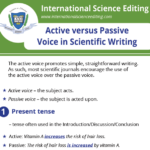This question was asked in the Q&A session of an online talk presented by International Science Editing. In this blog, we discuss how to respectfully dispute the findings of others. Acknowledge the good Begin by acknowledging what you liked. Rarely is a paper so poorly written that you cannot find a single aspect to commend. […]
Active versus passive voice in scientific writing (infographic)
In this infographic, we discuss the use of the active and passive voice in scientific writing. The infographic contains the following text: The active voice promotes simple, straightforward writing. As such, most scientific journals encourage the use of the active voice over the passive voice. Active voice – the subject acts. Passive voice – […]
How to write an introduction to a research report
In this blog, our guest blogger, Professor Emeritus Dolores Takemoto from Kansas State University discusses how to write an introduction. A thorough introduction is a necessary prerequisite for the most effective presentation of your research results. In addition, it optimizes your chances of getting your research report accepted for publication by a journal. Before you […]
“Many of our references are published in Chinese. Will this be a problem?”
This question was asked in the Q&A session of a recent talk on the topic of scientific publishing presented by International Science Editing in China. In this blog, we look more deeply at this question and discuss why there is no simple answer. Non-English sources may be a problem for reviewers Reviewers are generally instructed […]
Tips for writing sentences about science
Make your writing clear Say what you mean For example, the sentence The observed changes in the gut microbiota caused inflammation in the mice. suggests direct causation. However, if this was an observational study, the two outcomes were probably observed to occur together, but direct causation was not demonstrated. If so, the sentence should be […]





